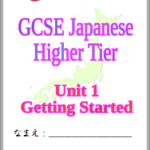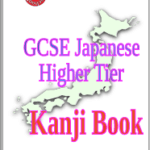Japanese GCSE Online Classes
I currently offer four Japanese GCSE classes, which are primarily aimed at non-native speakers:
There will be a new Beginner’s Class starting in September 2024 on Wednesdays from 6:00~7:00pm during term time. This class is for students with little or no knowledge of Japanese, who are aiming to sit their GCSE exams in 2027. It provides a comprehensive foundation in the Japanese language and culture, enabling students to develop their skills in a supportive and engaging environment.
The Key Stage 3 GCSE lower secondary class is for students aiming to sit their GCSE exams in 2026. It builds on the work they have been doing since they began the course last September. Classes are held on Tuesdays from 4:00~5:00pm during term time, and will continue in the new academic year from September.
The Key Stage 4 continuing GCSE Japanese class started in April 2022 and will be sitting the GCSE exams in the summer of 2025. This class meets on Wednesdays from 4:20 to 5:20pm during term time. From September this class will be working on the advanced elements of the GCSE course.
To support students taking their exams next year, there will be an additional weekly Exam Skills class from September. This class will focus on developing essential exam-taking strategies and techniques, through completing past papers in the Reading, Writing, Listening and Speaking exams. The exam skills class is suitable for students studying in the Key Stage 4 continuing Japanese online class, as well as those taking GCSE Japanese in their own school or college. This class will be held on Mondays from 4:30~5:30pm.
A-Level Online Classes
From September this year I will be running two Japanese A-Level classes:
For students who have completed the Japanese GCSE this summer, there will be a new Japanese A-Level class starting in September. This class will sit their final A-Level exams in the summer of 2026. The course will cover advanced grammar, vocabulary and kanji, through studying a variety of texts, including a selection of short literary works. Students will develop independent research skills by investigating an area of Japanese culture of their choice, and will learn how to write well-structured essays on a variety of topics. This class will meet twice-weekly on Tuesdays from 6:00~7:00, and Thursdays from 5:00pm~6:00pm.
The continuing A-Level Japanese class meets on Tuesday evenings from 8:00~9:00pm and Thursday evenings from 7:00~8:00pm. This class will be taking their final exams in the summer of 2025. In the second year of the course we will be studying an animated film, expanding our vocabulary through reading a variety of texts, and focussing on exam technique.
If you would like more information on these courses, or to enquire about individual or small group tuition, please complete the form which you will find here. The classes are particularly suitable for students who are homeschooled, or whose school is not able to offer Japanese.
Workbooks and Kanji Worksheets for Laminating
These workbooks cover the 2017 Japanese GCSE syllabus (Higher Tier) and form a beginner’s course which takes between two and four years to teach. They can also be used as the basis for independent study. The workbooks can be freely downloaded, printed, and used to write in. There is also a multimedia version of each book, with links to a wealth of online teaching resources and matching video tutorials.
In addition to the workbooks, there are kanji worksheets which can be printed out, assembled back-to-back, and laminated to form a laminated writing sheet, which can be used with a non-permanent whiteboard marker to practise the hiragana, katakana or kanji introduced in each unit.
If you are having trouble downloading the resources, please try a different browser as this sometimes solves the problem.

- Download the Unit 1 Workbook here
- Download the Unit 1 Multimedia Workbook here
- Download the Unit 1 Kanji Worksheets here
- Download the hiragana practice sheet here
- Download the katakana practice sheet here

- Download the Unit 2 Workbook here
- Download the Unit 2 Multimedia Workbook here
- Download the Unit 2 Kanji Worksheets here

- Download the Unit 3 Workbook here
- Download the Unit 3 Multimedia Workbook here
- Download the Unit 3 Kanji Worksheets here

- Download the Unit 4 Workbook here
- Download the Unit 4 Multimedia Workbook here
- Download the Unit 4 Kanji Worksheets here
Kanji Book

- Download the kanji Book here
Video Tutorials
You can access the video tutorials which support the GCSE Workbooks, by viewing them directly from the playlists on my Youtube channel.
Click here to link to interactive video tutorials which help students answer some common GCSE-level questions.
Online Tutoring
If you would like to contact me regarding online tutoring, please complete the online form here.
Firstly, this page is so helpful! I’m really grateful for it.
As the textbooks do not perfectly align with the current specification (while they are SO helpful, again, thank you so much), do you know where the full required vocabulary list and information on any other topics not covered could be found?
Hi William,
I’m glad you’re finding the page helpful. For the full list of vocabulary in the specification, please refer to the Pearson Edexcel website. I have added a link to the website on the GCSE page above. The vocabulary list in the specification is quite extensive and can be intimidating, so I recommend picking up additional advanced-level vocabulary at the end of the GCSE course by working through the past papers, which can be downloaded from the Pearson Edexcel website. These papers provide an idea of the vocabulary that tends to appear in the actual exams and serve as excellent revision tools in the final stages of the programme.
The principle behind my workbooks is to introduce all the key grammar patterns over the four Workbooks, including a limited vocabulary drawn from across the Themes and Topics in the specification. This approach allows students to become confident in the fundamentals of the language without being overwhelmed by an extensive vocabulary, which can be tackled later.
Hi there Rajakumar Sensei!
I am a student going to year 11 and will be doing Higher Tier Japanese GCSE. I was just wondering, with regards to the names of the booklets (Unit 1, Unit 2 etc). Do they correspond directly to Theme 1: Identity and Culture, and Theme 2:Local area, holiday and Travel?
Dear Werasi,
Thanks for your comment – that’s a very good question. These workbooks were developed many years before the current version of the syllabus, so they don’t match up exactly with the themes. Most of the themes are in there, but they are not grouped together in a logical way.
The workbooks cover all of the GCSE grammar (and a little more actually) and most of the key vocabulary, and would prepare a student well to achieve Grades 4 – 6. But in order to get the top Grades of 7 – 9 you would need to supplement the workbooks by systematically working through GCSE Japanese past papers. The past papers will give you all the advanced vocabulary that you need to get the top grades in your GCSE exams.
Unfortunately, I don’t have time to completely re-write the books every time the syllabus changes, so they are not a perfect preparation for the current GCSE Japanese exams.
Good luck with your exams next year!
がんばって!
I’m studying alone, and oh boy this was useful! Thanks a lot!
Also, are there any similar resources for JLPT? Thanks!
Thanks for your comment! There are lots of resources for the JLPT (but not on my website) – Just Google!
Thanks a lot!
I had already finished up those books within one week since I had learnt hiragana, katakana, and a load of kanji before hand, so that was easy.
The tough part was trying to check if my answers were correct.
So, are there any answer sheets for those who are self-studying to see if they got the stuff right?
Thanks!
Hi,
Well done for finishing the books so quickly! There are no answers to the questions, as many of them are open ended, and if you look at the explanations in the workbooks and the vocabulary sections, you should be mostly able to work out whether the answers are correct. If you are still not sure, try unputting your senstences into ‘Japanese Grammar Checker’ (https://sapling.ai/lang/japanese) to check if your sentences is grammatically correct. You can also ask ChatGPT (https://openai.com/chatgpt) to analyse and correct your sentences for you.
がんばって!
Dear Rajakumar sensei,
Hello, my name is Leo. I am half Japanese and am aspiring to complete the foundation tier of the Japanese Edexel GCSE. I was wondering if the workbooks were legible for the type of examination I am taking as I am aware that until not too long ago there was also a Cambridge version of the examination. Thank you .
Hi Leo,
These workbooks are specifically for the Edexcel Japanese GCSE exams – although they are designed for students taking the Hier tier examinations, rather than the Foundation tier. However, if you use these workbooks together with practice papers taken from previous years’ examinations you will be well prepared for the Foundation tier papers as well as the Higher tier papers.
Thank you so much! My son has his Japanese GCSE exam in the summer and your Youtube channel is so helpful for revision (and learning all the Kanji he doesn’t know yet!). The short clips make the task of preparing for the exam seem manageable now when he was feeling like quitting the subject altogether a few weeks ago.
Thank you so much for the comment. I wish your son all the best for his exams!
Oh my goodness these resources are an absolute GODSEND. I am so thankful for the guidance you have given me during my Japanese GCSE – arigatou gozaimasu!!
I’m glad that you’re finding them useful! Thanks for the comment.
I just want to say thank you for all these resources! It’s really helpful and I’ll definitely recommend it to my friends!
That’s great Yuki – thanks!
Hi Rajakumar Sensei,
I’m a university student who has just got the motivation to learn Japanese and I was wondering if the resources used would be suitable for indipendent study. I would assume following along the work books, as well as your video tutorials, would lead to a good start to learning but is that enough for me as a beginner?
Thank you,
George
Dear George,
Using these resources independently will start you off on your Japanese language learning journey – but in order to really improve I would recommend also using the many free internet sites (such as conversation exchange) which will connnect you with a Japanese native speaker who wants to learn your language. This will allow you to practise speaking Japanese (which you can’t do using my workbooks alone!
I just wanted to say that these resources are crazy helpful and are really helping me organise myself for my gcses so thank you!
Thank you Marta – I’m so glad.
I wanted to download the syllabus for my daughter as she is planning learn the Japanese workbook. I have tried several times but it’s not working. I even tried to download it from different browser but still it is not working. Please give me a solution. Thanks in advance.
I have reviewed all the links, and they should all be working properly now. Let me know if you are still having problems.
Anne
Hello,
Firstly i wanted to say thank you so much for your fantastic resources, they’re so detailed and helpful !!!
I’m having problems accessing the kanji worksheets for unit 1 ,2 and 3 , when i press the links I’m just redirected elsewhere.is it possible for you to email them to me on the email I entered ? I would really appreciate it !
Thanks again 🙂
I have reviewed all the links, and they should all be working properly now. Let me know if you are still having problems.
Anne
Hi Anne!
I have recently started your GCSE workbooks and I’m finding them amazing! After I take the GCSE exam, I was planning on taking an A-level exam in Japanese if they have one. Do you know if there is a Japanese A-level? If so, are you planning on making something similar to these workbooks? but if not, do you know any sites or textbooks that would help? Thank you!!
Dear Charlotte,
That’s great that you are finding the GCSE book useful. I’m afraid I don’t have any up-to-date resources for the new A-Level syllabus. I am not an expert on the A-level, so I can’t advise you very well, but a starting point for Japanese at that level is always the wonderful news website: News Web Easy (https://www3.nhk.or.jp/news/easy/). Hirogaru (https://hirogaru-nihongo.jp/en/) is also excellent for introducing really interesting texts, and although they are very challenging they come with subtitles. Finally, look at the Japan Foundation website for lots of resource ideas (https://www.jpf.org.uk/language/teaching_resources.php#as).
Good luck with your studies! がんばって!
Thanks for letting me know. It should be working now!
初めまして先生、
I have been trying to download the resources on this page, but the downloads fail every time. I’m not sure if it’s become of my own unstable internet connection, or if there is an issue with the website. Is there a Google Drive or an alternative source I could download these resources from?
Dear Rintaro,
I have checked that the resources download, and I have also found a problem. I have uploaded the problematic resources again and they seem to be downloading as they should. Please let me know if you are still having problems.
Dear Anne-sensei
I am a big fan of your GCSE books and I have always used your books in my past school.
This week I just started to work for a lovely school to teach GCSE Japanese to one student as a Japanese Tutor. The school is worried about making photocopy of the whole book and told me they can only copy 5% of each book. Could you please assure my school that we can download and make printed copies for our students so that we can use them in school?
Thank you very much.
Hi Shoko,
So pleased that you are using the books. These books, as you rightly pointed out, are designed to be downloaded, printed out and freely used. Please reassure your school that students and teachers who are legitimately using these resources for non-commercial use within an educational setting, are welcome to downlown the books in their entirety.
がんばって!
Anne
hi,
Thanks for creating such a great free resource, we have printed out all 4 booklets and have started them. My kiddo (13) is learning Japanese independently within our home education journey, your booklets are a big big help! They will sit the exam as soon as they have got through all your resources !
thanks again : )
That’s great to know. がんばって!
Anne
Hello! Thank you for creating such amazing resources!
My student who is studying GCSE spotted something in your kanji booklet. For the meaning of 北 it says “winter” rather than “North” (in the box on the right hand side).
He’s clearly going through your kanji booklet thoroughly and this makes me very happy! 🙂
Thank you to your eagle-eyed student!
Hi,
I’m struggling to find an exam centre that offers IGCSE Japanese 0519 to private students.
Dear Harpreet,
Your best option is to contact the Japan Foundation in London, who have a list of private tutors and schools which can conduct the exams. The IGCSE Japanese is tricky as they only have an exam session in November – why do you not do the regular GCSE Japanese course?
Dear Anne sensei
It was great to see you briefly at the last week workshop in London.
We use your workbooks to consolidate preparation for GCSE, they are EXCELLENT. My student just noticed that in the unit 4 book, on Page 73 where how to make plain negative form is explained, first removing ますthen change い→あ. We believe this to be a mistake, and should be い→わ as in 言います→言わない、会います→会わない.
Also, just for your attention that new spec grammar list has 「ないほうがいいです」as well as 「ないでください」.
Please ignore this message if you are updating Unit 4 workbook.
Again, thank you for sharing your great work. We really appreciate it.
Kind regards
Michiko
Dear Michiko-sensei,
Thanks for noticing that silly mistake! It has now been corrected. Your help with editing these books is much appreciated!
Anne
Dear Anne Sensei,
Thank you ever so much for the updated version of your Unit books. They are excellent. Would you be able to tell us when new Unit2 is going to be available?
Hisaka
Dear Hisaska,
Unit 2 has been uploaded, and am working on Unit 3.
Best wishes
Anne
Can I still use the workbooks for the new specification please?
They are being upgraded as we speak, and a quick look at the inside cover will tell you which syllabus it is for. I will upload as I finish each revised workbook.
Are the books on this page the revised ones? Thank you so much; this website is very helpful.
I have been using your workbooks and kanji books for years. My students love your books. We are very grateful to you. Some of my students this year created exercises based on your Kanji books and your Grammar book,
A year 12 made A-level Kanji on Memorise site called Japanese A-level Kanji
A year 10 made Quizlet kanji section for GCSE the number corresponds with Anne sensei’s GCSE Kanji book search for lottiebutler
A group of students made a section at the Memorise website for GCSE vocab, search for lstock
I have not yet managed to proof read all of them so probably you may find some typos but hope they help students of GCSE and A level.
Dear Hisaka,
Thank you so much for sharing this. I am sure everyone will find them useful!
Hello, many thanks for everything on here as it has helped very much. I’m now moving on to unit three in my self study and I’m just wondering about the genkouyoushi section at the end of unit two and three. What exactly are they for? I understand it’s for writing practice but are we to write about anything specific?
Thanks again,
Naomi
Dear Naomi,
I use the genkouyoushi to ask my students to write small sakubun (essays) on the topics which arise in the workbooks.I am impressed that you are using the books for self-study. I hope they are useful!
がんばって
Anne
Hi,
Thanks for including these study resources. I just wondered if there has been a change in the syllabus now they have introduced 1-9 scoring.
Many thanks,
Chelsie
Dear Chelsie,
The syllabus has changed somewhat with the new GCSE, however as this year is the final year of the old qualification, the resources do not yet reflect the changes. Here is the link to the new syllabus:
https://qualifications.pearson.com/content/dam/pdf/GCSE/Japanese/2017/specification-and-sample-assessments/specification-GCSE-L1-L2-in-japanese-2017.pdf
がんばって
i’m studying japanese at GCSE level, i was wondering if you had anything specifically on learing kanji. any books you could reccomend?
Dear Saskia,
There is a downloadable kanji book on this website:
http://japanese4schools.co.uk/wp-content/uploads/2014/11/GCSE-Kanji-Book-2009-Syllabus.pdf
There are also lots of ‘memory’ sites like ‘memories’, where you can use lists which others have made, or your own lists.
Finally – make your own flashcards and carry them with you wherever you go. Then when you have a moment, you can pull them out and do some quick revision. Small amounts of revision regularly are the way to go!
がんばって
Hello, I am thinking of starting to teach my own children Japanese ( I have been teaching Japanese previously , but not in the UK and mainly adults) What would you recommend as the first starting point for 11 and 13 y olds? My children are homeschooled and I would like to prepare them for GCSE myself
Thank you
Lela Pertia
Dear Lela,
The four workbooks in the GCSE section more or less cover the GCSE syllabus, so I would work through them first, then do past papers to make sure you have covered everything.
がんばって
These look perfect for my children who are self studying for the GCSE at home. We’d like a price for you printing it all and send it out to us. Would this be possible?
Dear Steven,
I’m afraid that I’m not able to print the books and send them, but as they are freely downloadable you should be able to find a place where they are able to print the material for you.
Best wishes
Anne
Thanks so much! I’m 11 and have a Japanese tutor and thinking of taking a Japanese GCSE, all the resources on this site are very helpful and I am looking forward to studying the subject more,
Thanks and regards
Kara
Hello, I am 14 and self teaching Japanese, these workbooks have been EXTREMELY helpful and I don’t know what I would do without them, thank you so so much. However, in the writing exam we have to give extended answers on topics such as the environment and the culture of japan, as well as leisure activities etc. Do you know anywhere where I could read about the specific topics (especially environment) which are needed for the gcse since I do not know where to find this information. If you have made anything based on these topics which would be helpful to me, please let me know!
Hi Abi,
If you cover everything in the workbooks you should be fine for the GCSE. If you want to extend your knowledge of particular subject areas you can find some excellent resources on the Japan Foundation London website.
がんばって
Hi,
I am 14 and am wondering the best way to study Japanese. I can write in kana but I would like to learn the language properly. All resource I have found previously are too simple or based on older people. Can you help?
Thanks.
Hi Antonia,
I am not sure where you are living – but the Japan Foundation (in London if you are in the UK) is the first place to start. They can help you with tutors and other materials and information, including online learning resources.
Good Luck,
Anne
Hi Antonia,
Have a look at the resources on the Japan Foundation website in London. This will give you a feel for the many resources which are available to support your Japanese study. I am sure that you will be able to find an appropriate level amongst the material they list. There are great online resources – if you wish to pay for a subscription I would recommend FluentU, which uses authentic videos to teach the language.
Best wishes
Anne